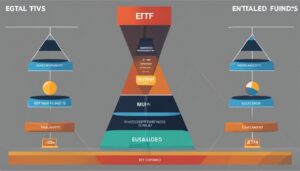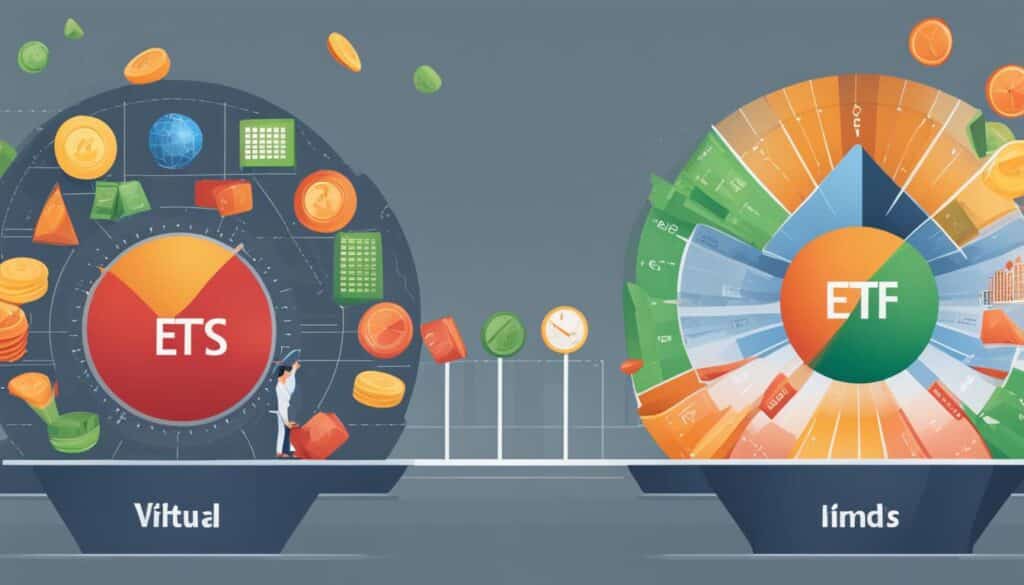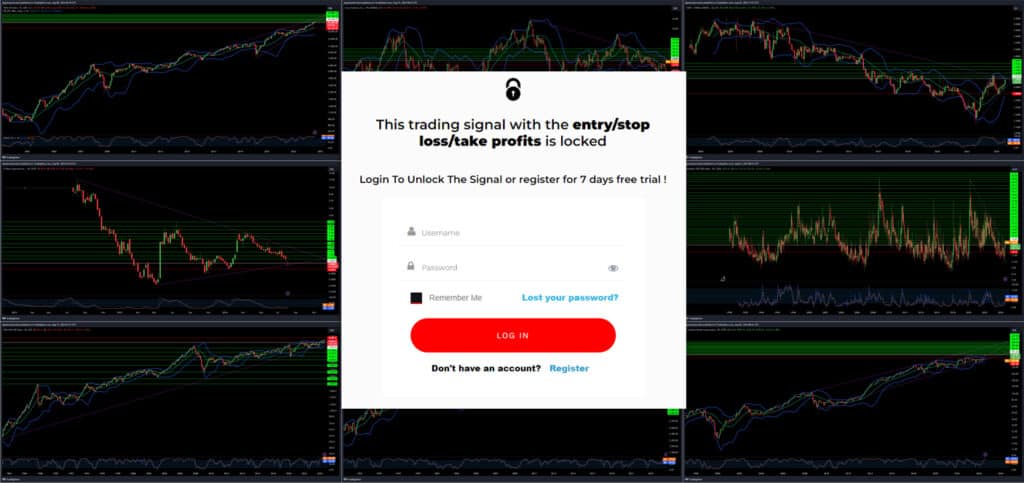Investing in the financial markets can be complex and intimidating, especially for retail investors. However, there are various investment vehicles available that can help individuals achieve their financial goals. Two popular options are exchange-traded funds (ETFs) and mutual funds. In this article, I will dive into the world of ETFs and mutual funds, comparing their features, benefits, and drawbacks to help you make an informed investment decision.
Key Takeaways:
- ETFs and mutual funds are passive investment options that allow diversification across various asset classes.
- ETFs are traded on stock exchanges like individual stocks, whereas mutual funds are bought and sold at the end of the trading day at the net asset value (NAV).
- ETFs generally have lower expense ratios compared to mutual funds and offer tax advantages.
- Mutual funds provide active management by professional fund managers and offer features like automatic investment plans and dividend reinvestment.
- The choice between ETFs and mutual funds depends on individual investment goals, risk tolerance, and preferences.
How ETFs and Mutual Funds Work
Investing in financial markets has become increasingly popular in recent years, with individuals seeking to grow their wealth and achieve their financial goals. Two common investment options that provide access to a diverse range of assets are Exchange-Traded Funds (ETFs) and Mutual Funds.
Exchange-Traded Funds (ETFs) are passive investment vehicles that combine the characteristics of direct investment in shares with pooled or collective funds. They typically mirror the performance of an index or a specific asset class.
“ETFs are designed to provide investors with a convenient and cost-effective way to gain exposure to a wide range of assets,” says John Collins, a financial advisor at XYZ Investments. “By mirroring the performance of an index, investors can achieve broad market exposure without having to buy individual stocks.”
On the other hand, Mutual Funds are actively managed investment vehicles that pool money from multiple investors to invest in a diversified portfolio of securities. Professional fund managers make investment decisions on behalf of the fund’s investors, actively buying and selling securities to maximize returns.
“Mutual funds offer professional management and the advantage of diversification,” explains Jane Thompson, a senior portfolio manager at ABC Asset Management. “With mutual funds, investors can benefit from the expertise of experienced fund managers who actively analyze and select investments to achieve their investment objectives.”
Both ETFs and mutual funds provide investors with the opportunity to gain exposure to a wide range of assets and diversify their portfolios. However, their underlying structures and investment approaches differ.
Comparing ETFs and Mutual Funds
When considering the key similarities and differences between ETFs and mutual funds, it is essential to understand how they are bought and sold, their cost structures, and their tax implications.
Similarities:
- Both ETFs and mutual funds offer investors the ability to gain exposure to a diversified portfolio of assets.
- They allow investors to pool their money with other investors, providing access to a larger pool of investment opportunities.
- Both investment vehicles provide liquidity, allowing investors to buy or sell shares on a daily basis.
- Investors can reinvest dividends or receive cash distributions from both ETFs and mutual funds.
Differences:
| Aspect | ETFs | Mutual Funds |
|---|---|---|
| Structure | Pooled investments that mirror the performance of an index or specific asset class. | Pooled investments actively managed by fund managers to achieve investment objectives. |
| Buying and Selling | Traded on stock exchanges like individual stocks, with prices fluctuating throughout the trading day. | Bought and sold at the end of the trading day at the net asset value (NAV). |
| Cost Structure | Generally lower expense ratios compared to mutual funds. | Expense ratios can be higher than those of ETFs. |
| Tax Implications | Offer tax advantages due to their structure that allows for more efficient capital gains distributions. | Subject to capital gains taxes, and may distribute taxable capital gains to investors. |
Understanding these differences is crucial for investors when deciding between ETFs and mutual funds. It allows them to choose investments that align with their investment goals, risk tolerance, and preferences.
“Both ETFs and mutual funds present distinct advantages and considerations,” advises Sarah Johnson, a certified financial planner at DEF Wealth Management. “Investors should carefully evaluate their investment objectives and consult with a financial advisor to determine the most suitable option.”
Key Differences Between ETFs and Mutual Funds
When comparing ETFs and mutual funds, it is important to understand their key differences. These differences can impact how they are bought and sold, their cost structure, and potential tax advantages.
1. Buying and Selling
One notable difference is how ETFs and mutual funds are bought and sold. ETFs trade on stock exchanges like individual stocks, which means their prices fluctuate throughout the trading day. On the other hand, mutual funds are bought and sold at the end of the trading day at the net asset value (NAV).
2. Cost Structure
The cost structure is another important difference to consider. ETFs generally have lower expense ratios compared to mutual funds. Expense ratios include management fees, operating expenses, and other costs associated with running the fund. Lower expense ratios can potentially lead to higher returns for investors.
3. Tax Advantages
ETFs offer certain tax advantages due to their unique structure. They have a creation and redemption process that allows for more efficient capital gains distributions. This means that investors may have less tax liability when compared to mutual funds.
Overall, understanding the differences between ETFs and mutual funds can help investors make informed decisions. It is important to consider factors such as buying and selling mechanisms, cost structure, and potential tax advantages to determine which investment vehicle aligns with individual goals and preferences.
Benefits and Drawbacks of ETFs and Mutual Funds
Both ETFs and mutual funds offer unique benefits and drawbacks for investors. Let’s explore the advantages and disadvantages of each investment vehicle:
Benefits of ETFs
ETFs provide investors with several advantages that make them an attractive option:
- Intraday trading: ETFs can be bought and sold throughout the trading day, offering investors increased flexibility and the ability to react quickly to market changes.
- Diversification: ETFs typically track an index or a specific asset class, giving investors exposure to a wide range of securities and reducing individual stock risk.
- Transparency: The holdings of ETFs are disclosed on a daily basis, allowing investors to see exactly what assets they own within the fund.
- Lower expense ratios: ETFs generally have lower management fees and operating costs compared to mutual funds, making them a cost-effective investment option.
Drawbacks of ETFs
Despite their benefits, ETFs also come with a few drawbacks that investors should consider:
- Tax efficiency: While ETFs are generally tax-efficient, they can still generate capital gains when investors sell their shares. These gains may be subject to taxes.
Benefits of Mutual Funds
Mutual funds offer unique advantages that cater to different investor needs:
- Active management: Mutual funds are actively managed by professional fund managers who make investment decisions on behalf of investors. This can be advantageous for those who prefer a hands-off approach to investing.
- Automatic investment plans: Mutual funds often provide the ability to set up automatic investment plans, allowing investors to regularly contribute to their investments without constant monitoring.
- Dividend reinvestment: Many mutual funds offer the option to reinvest dividends automatically, allowing investors to compound their returns over time.
Drawbacks of Mutual Funds
However, there are a few drawbacks to consider when investing in mutual funds:
- Higher expense ratios: Mutual funds typically have higher expense ratios compared to ETFs, which can eat into overall returns over time.
- Capital gains taxes: Mutual funds can generate capital gains when the fund manager buys and sells securities within the portfolio. Investors may be subject to capital gains taxes on these distributions.
In summary, ETFs offer advantages such as intraday trading, diversification, transparency, and lower expense ratios. On the other hand, mutual funds provide active management and convenient features like automatic investment plans and dividend reinvestment. It’s important for investors to carefully evaluate their investment goals, risk tolerance, and preferences to choose the option that aligns best with their needs.
Conclusion
After comparing ETFs and mutual funds, it is clear that both investment vehicles have their own set of advantages and disadvantages. ETFs are attractive to investors looking for low-cost, tax-efficient options that provide transparency in their investments. On the other hand, mutual funds offer active management and features like automatic investment plans.
When making the decision between ETFs and mutual funds, it is essential for investors to evaluate their individual investment goals, risk tolerance, and preferences. Some investors may prefer the hands-off approach of ETFs, while others may value the expertise of professional fund managers offered by mutual funds.
Regardless of the chosen option, it is crucial for investors to consult with financial advisors and take the time to carefully consider all available options, ensuring that their investment decisions are well-informed and aligned with their financial objectives.
Overall, understanding the differences and benefits of ETFs and mutual funds can empower investors in building balanced and diversified portfolios that align with their long-term financial goals.
FAQ
What are ETFs and mutual funds?
ETFs (Exchange-Traded Funds) are passive investments that track the performance of underlying assets, while mutual funds are actively managed investment vehicles that pool money from multiple investors to invest in a diversified portfolio of securities.
How do ETFs and mutual funds differ in buying and selling?
ETFs are traded on stock exchanges, like individual stocks, and their prices fluctuate throughout the trading day. On the other hand, mutual funds are bought and sold at the end of the trading day at the net asset value (NAV).
What is the difference in cost structure between ETFs and mutual funds?
ETFs generally have lower expense ratios compared to mutual funds.
What are the tax advantages of ETFs?
ETFs offer tax advantages due to their structure that allows for more efficient capital gains distributions.
What are the benefits of investing in ETFs?
ETFs offer benefits such as intraday trading, diversification, transparency, and lower expense ratios. They are also more tax-efficient.
What are the advantages of mutual funds?
Mutual funds provide active management by professional fund managers, automatic investment plans, and the ability to reinvest dividends.
What are the drawbacks of mutual funds?
Mutual funds tend to have higher expense ratios and are subject to capital gains taxes.
How should I choose between ETFs and mutual funds?
The choice between ETFs and mutual funds depends on individual investment goals, risk tolerance, and preferences. It is important to carefully consider options and consult with financial advisors to make informed investment decisions.
Source Links
- https://www.forbes.com/uk/advisor/investing/cryptocurrency/bitcoin-etf-approval/
- https://finance.yahoo.com/news/himalaya-technologies-applauds-miletone-sec-163400893.html
- https://www.barrons.com/livecoverage/stock-market-today-011124
Disclaimer
All information on this website is of a general nature. The information is not adapted to conditions that are specific to your person or entity. The information provided can not be considered as personal, professional or legal advice or investment advice to the user.
This website and all information is intended for educational purposes only and does not give financial advice. Signal Mastermind Signals is not a service to provide legal and financial advice; any information provided here is only the personal opinion of the author (not advice or financial advice in any sense, and in the sense of any act, ordinance or law of any country) and must not be used for financial activities. Signal Mastermind Signals does not offer, operate or provide financial, brokerage, commercial or investment services and is not a financial advisor. Rather, Signal Mastermind Signals is an educational site and a platform for exchanging Forex information. Whenever information is disclosed, whether express or implied, about profit or revenue, it is not a guarantee. No method or trading system ensures that it will generate a profit, so always remember that trade can lead to a loss. Trading responsibility, whether resulting in profits or losses, is yours and you must agree not to hold Signal Mastermind Signals or other information providers that are responsible in any way whatsoever. The use of the system means that the user accepts Disclaimer and Terms of Use.
Signal Mastermind Signals is not represented as a registered investment consultant or brokerage dealer nor offers to buy or sell any of the financial instruments mentioned in the service offered.
While Signal Mastermind Signals believes that the content provided is accurate, there are no explicit or implied warranties of accuracy. The information provided is believed to be reliable; Signal Mastermind Signals does not guarantee the accuracy or completeness of the information provided. Third parties refer to Signal Mastermind Signals to provide technology and information if a third party fails, and then there is a risk that the information may be delayed or not delivered at all.
All information and comments contained on this website, including but not limited to, opinions, analyzes, news, prices, research, and general, do not constitute investment advice or an invitation to buy or sell any type of instrument. Signal Mastermind Signals assumes no responsibility for any loss or damage that may result, directly or indirectly, from the use or dependence on such information.
All information contained on this web site is a personal opinion or belief of the author. None of these data is a recommendation or financial advice in any sense, also within the meaning of any commercial act or law. Writers, publishers and affiliates of Signal Mastermind Signals are not responsible for your trading in any way.
The information and opinions contained in the site are provided for information only and for educational reasons, should never be considered as direct or indirect advice to open a trading account and / or invest money in Forex trading with any Forex company . Signal Mastermind Signals assumes no responsibility for any decisions taken by the user to create a merchant account with any of the brokers listed on this website. Anyone who decides to set up a trading account or use the services, free of charge or paid, to any of the Broker companies mentioned on this website, bears full responsibility for their actions.
Any institution that offers a service and is listed on this website, including forex brokers, financial companies and other institutions, is present only for informational purposes. All ratings, ratings, banners, reviews, or other information found for any of the above-mentioned institutions are provided in a strictly objective manner and according to the best possible reflection of the materials on the official website of the company.
Forex/CFD trading is potentially high risk and may not be suitable for all investors. The high level of leverage can work both for and against traders. Before each Forex/CFD investment, you should carefully consider your goals, past experience and risk level. The opinions and data contained on this site should not be considered as suggestions or advice for the sale or purchase of currency or other instruments. Past results do not show or guarantee future results.
Neither Signal Mastermind Signals nor its affiliates ensure the accuracy of the content provided on this Site. You explicitly agree that viewing, visiting or using this website is at your own risk.




